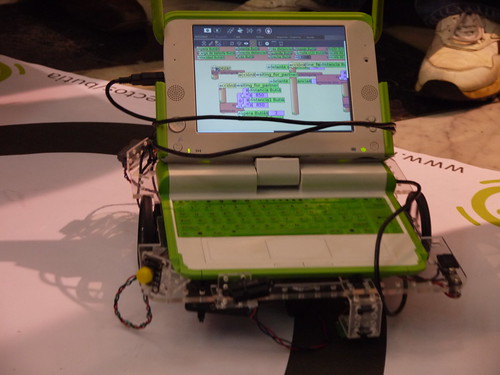The past week has gone faster than ever, at the Conozco Uruguay tour run by Pablo Flores and RAP Ceibal, and a conference being organized by CeibalJAM volunteers. I can't blog the whole thing, so, highlights:
Thursday - the reunionAfter typing a big report in Spanish at work, I went downtown to the conference launch at an art university. People flew in from everywhere, including Boston and San Francisco.
Here you see an XO-controlled robot invented by university students:

CC-BY-SA flickr.com/madprime
Friday - the Sugar systemIf you were starting a school from nothing, you could make a very interesting one using our software for the XOs. One of the key parts of this theory would be teaching programming and teaching it well. All of the kids know how to make geometric shapes in the Logo/Turtle program, but here we had something much more advanced. Theoretically we can address gaps in kids' education and inequalities in schools by giving them a better kind of learning (constructionism), and software that allows that learning to happen.
Saturday - swapping storiesI talked about Uganda on the Deployments panel. This included Madagascar, Paraguay, Peru, Rwanda, and Nepal. Each speaker was translated in realtime to the audience's headphones.

Image CC-BY-SA Christoph DerndorferDuring the unconference, anyone could suggest a talk. OLPC's experts/idealists discussed robots, sensors, and inspiration from
The Diamond Age, a book which also inspired me in Uganda. My talk was on maps, particularly
the Map activity,
olpcMAP, and the new sensors activity. I started bilingual, but the discussion turned entirely Spanish. Teachers were especially interested in the sensors and putting more information and easy downloads online for all of the activities.

Users of the Map activity in Uruguay
|

Memorize con Sensores
|
After a special session on hackerspaces, a few of us then went to visit Uruguay's own
HackSpace Montevideo. This is a space where programmers and garage-builders can pool their resources to buy advanced tools and build incredible projects. The space here was quite new, but they had WiFi antennas and a homemade plotter printer assembled with resourceful use of low-cost materials. Also, a library full of books such as "Organizing Free Software Groups in Latin America" and my former employer Deitel's C++ book.














 Me gusta eso libro
Me gusta eso libro





